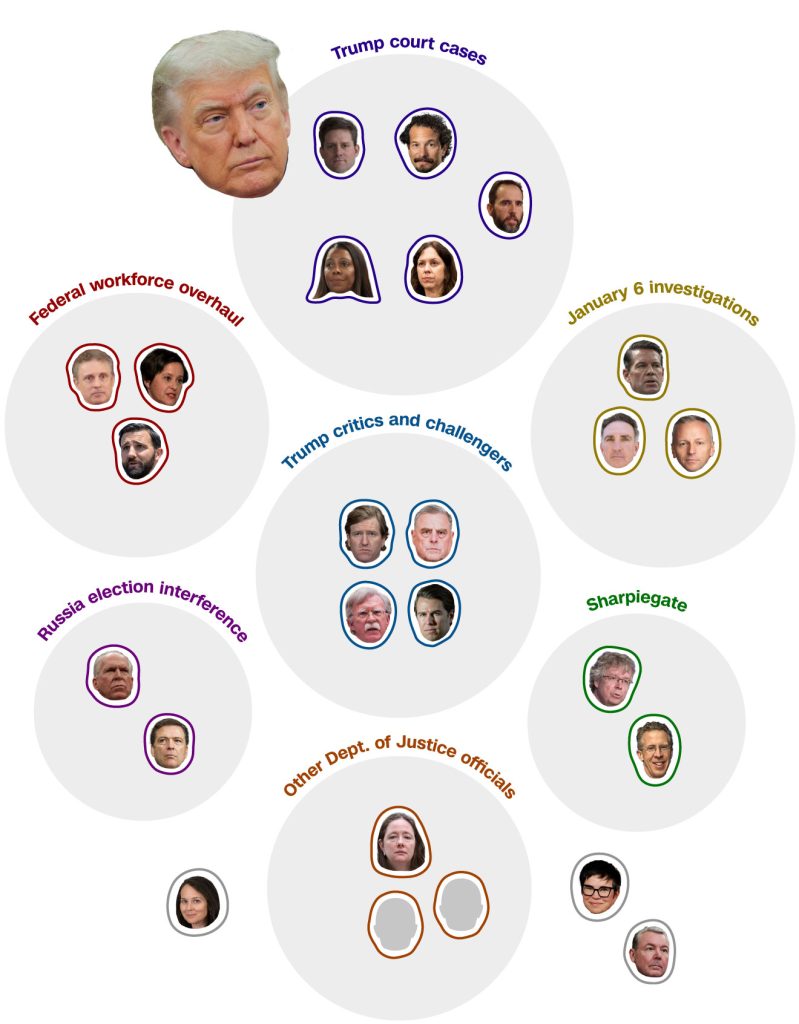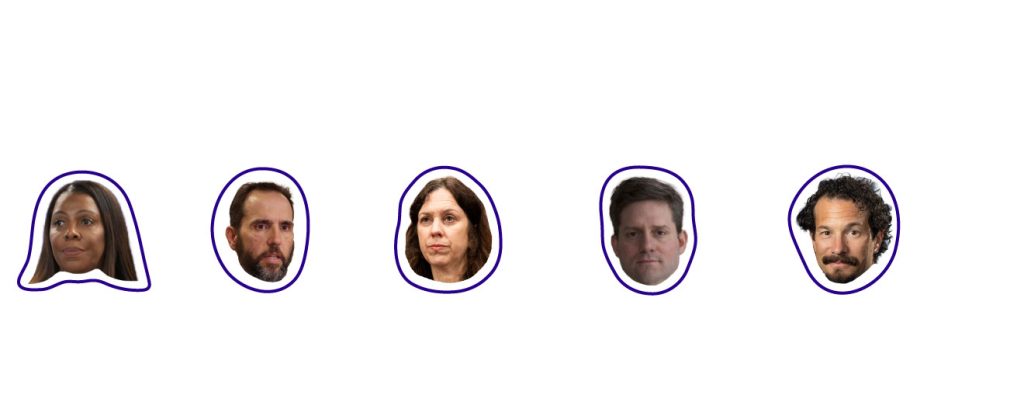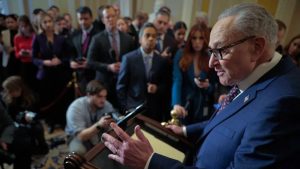Tracking Trump’s retaliation
During the last presidential campaign, Donald Trump made clear his motivations in trying to retake the White House.
“In 2016, I declared ‘I am your voice.’ Today I add, I am your warrior, I am your justice and for those who have been wronged and betrayed, I am your retribution,” Trump said at the 2023 Conservative Political Action Conference.
More than two years later, Trump has so far used his second term to make good on that promise, enacting what in many cases appears to be payback against a wide swath of critics and perceived political enemies.
Through a mix of presidential powers including executive orders and federal investigations, Trump has sought retribution on a number of fronts, targeting those involved in the multiple legal cases against him, including his indictments for hoarding classified documents and attempting to overturn the 2020 election, as well as the probe into Russia’s election interference in the 2016 election.

In a high-profile case, New York Attorney General Letitia James was indicted on October 9 on charges of bank fraud and making false statements to a financial institution. James led the successful civil fraud lawsuit against Trump, three of his children and a pair of business associates.
A few weeks earlier, former FBI director James Comey was indicted on September 25 on charges of obstruction of a congressional proceeding and giving false statements. He is the first person to face federal charges in one of Trump’s largest grievances: the 2016 investigation into whether his first presidential campaign colluded with Russia. Comey pleaded not guilty to both charges.
Trump told reports following Comey’s indictment that he expects other political opponents to be prosecuted.
“It’s not a list, but I think there will be others,” Trump said.
In another act of retribution, the home of John Bolton — Trump’s former national security adviser who has since become publicly critical of his former boss — was searched by the FBI on August 22, which some saw as an escalation of the president’s retribution agenda. The investigation first began in 2020 and was recently reopened by the Justice Department. Senior Justice Department leaders are advocating for a charge against Bolton, sources tell CNN.
Trump also moved to canceled the Secret Service detail of former Vice President Kamala Harris, his opponent in the 2024 election. The president also previously canceled the security details of Bolton and Gen. Mark Milley, an official from his first term.
Trump has also revoked the security clearances of more than 100 people so far, including high-ranking officials from the Biden administration, and many other long-time government officials. He’s also fired scores of people, and sought to investigate many of his public critics, including former members of his own prior administration.
Several of Trump’s actions have faced legal challenges — with mixed success. Among the people targeted by Trump, several have yet to comment, while others have remained defiant. Some have also slammed his moves as being politically motivated.
In a statement to CNN, the White House said: “Joe Biden weaponized his Administration to target political opponents – most famously, President Trump.”
“President Trump is restoring integrity to our government,” White House spokesperson Davis Ingle said in the statement. “Anyone who engages in criminal activity should be held accountable. No one is above the law. President Trump’s only retribution is success and historic achievements for the American people.”
Here are some of the people Trump and his administration have targeted:

Trump faced four indictments and one conviction during his time out of office, along with a loss in a civil case involving his business. The president has since decried that all the probes were politically motivated weaponization of the Justice Department.
Prior to her October indictment, New York Attorney General Letitia James was under investigation since May over a 2023 mortgage she took out to help her niece buy a home in Norfolk, Virginia. In August, the Justice Department subpoenaed James’ office, seeking information about her investigations into the Trump Organization and the National Rifle Association, sources told CNN. A grand jury investigation into James is also underway, according to a source familiar, which looks into whether James violated Trump’s constitutional rights.
“Attorney General James is focused every single day on protecting New Yorkers, especially as this Administration weaponizes the federal government against the rule of law and the Constitution,” a spokesperson for James said in a statement to CNN. “She will not be intimidated by bullies – no matter who they are.”
Jack Smith, the former special counsel who led criminal probes into Trump’s handling of classified documents and alleged efforts to subvert the 2020 election, is also under investigation. The Office of the Special Counsel — which is distinct from special counsels, like Smith, who are appointed to oversee politically sensitive Justice Department investigations — is probing Smith for allegedly violating the Hatch Act, which limits certain political activities of government workers.
Attorneys for Smith said in a letter obtained by CNN that the investigation is based on “imaginary and unfounded” accusations.
“Mr. Smith followed well-established legal principles in conducting the investigations into President Trump, and the courts presiding over the resulting prosecutions have already rejected the spurious allegations that the manner in which Mr. Smith prosecuted these cases was somehow improper,” his attorneys Lanny Breuer and Peter Koski wrote.
Trump also took aim at the National Archives, a historically non-political agency that became embroiled in Trump’s legal cases after it asked the Justice Department to investigate Trump’s alleged mishandling of classified documents after he left office in his first term.
Soon after returning to the White House, Trump fired Colleen Shogan, the archivist of the United States, and forced out deputy archivist William Bosanko. A source told CNN that Trump officials made it clear to staff at the National Archives that the White House wanted to remove the leadership team and replace top officials with Trump loyalists.
Shogan said on LinkedIn at the time that she wasn’t given any reason for her firing, adding, “I have zero regrets.”
In August, Brian Driscoll — the former acting FBI director before Trump’s nominee Kash Patel was confirmed — was also fired. Driscoll said in a letter to his colleagues that he was not given a reason for his firing either, adding, “Our collective sacrifices for those we serve is, and will always be, worth it. I regret nothing,”
A source told CNN that among the issues that caused discord with top officials in the FBI was Driscoll not disciplining an FBI pilot for Patel after it was discovered he was involved in issuing a subpoena in the Mar-a-Lago investigation into Trump and associates.
In his effort to shrink and overhaul the federal workforce, Trump directed agencies to fire employees en masse. Then, the president fired two officials who were tasked with protecting federal employees.
In February, Hampton Dellinger — the former head of the Office of Special Counsel who protected whistleblowers from retaliation — and Cathy Harris — former chair of the Merit Systems Protection Board, which reviews federal employee firings — were removed from their jobs.
Dellinger sued the Trump administration but after some legal back and forth, he ultimately dropped his case, citing long odds of winning at the Supreme Court after the federal Circuit Court in Washington, DC sided with Trump’s Justice Department to keep him out of the special counsel role.
Dellinger said in a statement at the time, “The harm to the agency and those who rely on it caused by a Special Counsel who is not independent could be immediate, grievous, and, I fear, uncorrectable.”
A federal judge in March ruled that Harris can keep her job, finding that Trump unlawfully fired her. Harris celebrated the ruling at the time, saying “I’m glad the Court has ruled on just how illegal Donald Trump’s action here has been.”
Trump also fired a high-ranking official critical of his efforts to reshape the federal government.
Cameron Hamilton, acting director of Federal Emergency Management Agency (FEMA), was removed from his job in May — a day after he broke with the administration and told lawmakers that he does not support dismantling the agency.
And in August, FEMA placed several employees on administrative leave effective immediately, just one day after they signed an open letter warning Congress that the Trump administration’s sweeping overhaul of the agency could lead to catastrophic failures in disaster response.
In the letter, more than 180 current and former FEMA employees — most signing anonymously — asked Congress to make FEMA a Cabinet-level, independent agency – insulated from political meddling and empowered to respond swiftly when disaster strikes.
The authors warned in the letter: “we hope (these changes) come in time to prevent not only another national catastrophe like Hurricane Katrina, but the effective dissolution of FEMA itself and the abandonment of the American people.”
Trump has defended rioters who stormed the US Capitol on January 6, 2021, since the end of his first term. Once he returned to office, he gave broad clemency to the rioters and targeted those who investigated and brought charges against them.
Michael Gordon, the former assistant US Attorney in the US Attorney’s Office for the Middle District of Florida, was fired in June. In a lawsuit with two other former Justice Department officials, Gordon claims that his dismissal was a “retaliation” because he prosecuted high-profile January 6 cases.
Similarly, Steve Jensen — the former acting director of the Washington Field Office for the FBI, who played a role in the investigation of January 6 rioters — was also dismissed from his role in August.
Trump has also gone after James Dennehy, the head of the FBI’s New York division, who vowed to support FBI employees who were asked to explain their involvement in the agency’s investigation of January 6. After saying that he’s preparing to “dig in” to defend those FBI employees, Dennehy wrote in an email to colleagues in March that he was told he “needed” to retire.
Four officials from Trump’s first term are currently under investigation after speaking out against the president.
The FBI’s search of Bolton’s home was part of a renewed investigation into whether he disclosed classified information in his 2020 book, two people familiar with the matter told CNN. Trump had previously threatened to jail Bolton over the 2020 book, which was critical of Trump’s foreign policy knowledge, and the Justice Department investigated him during Trump’s first term.
Gen. Mark Milley, the former chairman of the Joint Chiefs of Staff, has also been a critic of his former boss and even called him a fascist. Just days into Trump’s second term, Defense Secretary Pete Hegseth ordered an investigation into Milley to determine whether a review of his rank is necessary.
Meanwhile, via executive orders, Trump called for an investigation into former Department of Homeland Security official Miles Taylor and former Cybersecurity and Infrastructure Security Agency Director Chris Krebs.
Taylor anonymously wrote a 2018 New York Times op-ed claiming he was part of the “resistance” to Trump’s presidency. In the op-ed, Taylor said “many of the senior officials in his own administration are working diligently from within to frustrate parts of his agenda and his worst inclinations.” Taylor, who subsequently went public as the author of the op-ed in October 2020, went on to write a book, “Anonymous,” that was critical of Trump.
Speaking at the White House after the executive order, Trump claimed that Taylor was “guilty of treason.”
Taylor responded to the executive order in a post on X, saying, “I said this would happen. Dissent isn’t unlawful. It certainly isn’t treasonous. America is headed down a dark path. Never has a man so inelegantly proved another man’s point.”
Krebs was fired during Trump’s first term after he rejected the president’s claims of widespread voter fraud during the 2020 election.
“He’s the fraud. He’s a disgrace,” Trump said of Krebs in April.
Following the executive order, Krebs resigned as the chief intelligence and public policy officer at SentinelOne, and referenced the investigation in his letter to colleagues, which he posted on LinkedIn.
“For those who know me, you know I don’t shy away from tough fights. But I also know this is one I need to take on fully — outside of SentinelOne,” the letter read. “This will require my complete focus and energy. It’s a fight for democracy, for freedom of speech, and for the rule of law. I’m prepared to give it everything I’ve got.”
The Trump administration has also gone after at least three other Justice Department employees, firing them for separate reasons.
In April, Trump’s DOJ fired Erez Reuveni — an immigration lawyer who argued for the government in the mistaken deportation of Kilmar Abrego Garcia — accusing him of sabotaging its legal case. Reuveni was initially placed on administrative leave and then fired after he expressed frustration with the government’s inability to provide answers to questions from a judge in the case.
As the Trump administration faced mounting scrutiny over its handling of documents related to accused sex trafficker Jeffrey Epstein, the Justice Department in July fired Maurene Comey, a federal prosecutor in the Epstein case and the daughter of former FBI Director James Comey, who has been critical of Trump. James Comey was fired by Trump in his first term.
The Justice Department in July also fired prosecutor Desiree Leigh Grace after she was chosen by federal judges in New Jersey to replace Alina Habba, Trump’s pick for US attorney in the state, whose interim appointment was set to expire. Following her firing, Grace posted a message on LinkedIn, in which she pushed back that politics played any part in her job performance and vowed to assume the position she was appointed to by the judges.
Two high-ranking officials at the National Oceanic and Atmospheric Administration were placed on administrative leave in July.
Both officials — Steve Volz, who heads NOAA’s satellites division, and Jeff Dillen, deputy NOAA general counsel — led the investigation into whether NOAA’s scientific integrity policies were violated during the so-called Sharpiegate scandal of Trump’s first term.
A copy of a letter informing Volz he was being placed on leave references an “investigation” into his “recent conduct,” though NOAA sources did not know what that may refer to. The letter came from acting NOAA administrator Laura Grimm.
It is not clear if Dillen’s letter also referenced an investigation. The Sharpiegate scandal appears to be the only significant event that links the two men, though the personnel moves could be coincidental.
In 2019, Trump modified the National Weather Service’s forecast cone of Hurricane Dorian — with a sharpie — to suggest that the storm might hit Alabama.
Volz and Dillen’s investigation found that then-acting NOAA administrator Neil Jacobs and another NOAA official violated the agency’s scientific integrity policy by backing Trump’s hand-drawn version of the forecast. Jacobs has been nominated to become NOAA administrator in Trump’s current term.
In an interview with the Washington Post, Volz questioned the move to put him on leave, asking, “Why now?”
“Maybe the desire here is to get anybody who might slow down their ability to execute their plan out of the way. I think I’m one of those people,” he told the Post.


